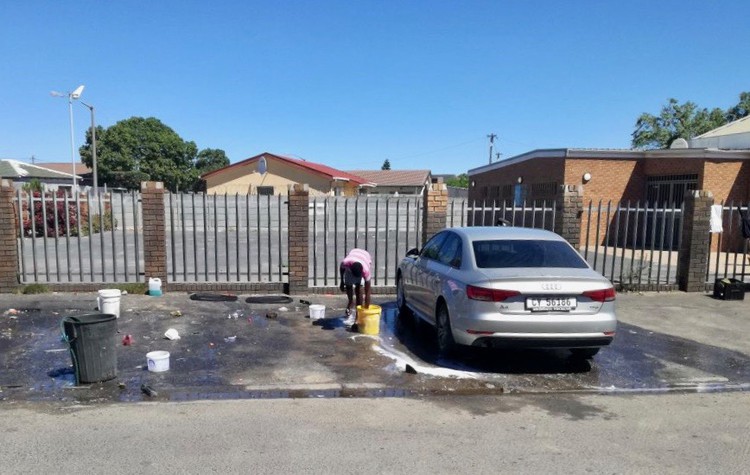Car wash jobs threatened by water restrictions
Informal operators say it’s their only form of employment
Mandla* has to pay R2,000 or serve jail time after he was fined for “wasting water” at his car wash business in Philippi.
Last weekend Metro police, City of Cape Town water and sanitation staff, and law enforcement staff conducted a blitz on car washers in Belhar, Delft and Khayelitsha looking for contraventions of water restrictions.
In a statement the City said 16 car washes had been visited and a number of fines issued. “Numerous hose pipes, drums and car wash equipment” were confiscated.
Mandla was fined last year. “It happened last September, when the water crisis issue started gaining momentum,” he said. “Law enforcement came, told us that we were wasting water, then confiscated our hose pipe and cones. We were given no warning or anything. We were fined R2,000.”
Mandla appeared in court on 7 February after failing to pay the fine. He must pay by 30 April or face prison.
He lives with his unemployed girlfriend and has to also provide for two children, his mother and his sister.
“I didn’t pay the fine because I don’t have that money,” he said. “The car wash was my main source of employment. It was not just a business. It was survival. I am unemployed after losing my job as a security guard in 2016 when my contract ended.”
Mandla ran his car wash with four other men in Philippi on Lansdowne Road.
He said he was offered no alternative, such as advice or help converting to waterless car washing.
Now he has slowly restarted his business, charging R40 to wash small cars and R50 to wash bigger vehicles and taxis. He uses municipal water. One bucket washes about three cars.
“Water is not always available. They turn the water off once you’ve finished the daily litres the City gives you. There is a tap in Block 6 here in Philippi, that we have to walk to which doesn’t run out; so we have to collect all the way over there,” said Mandla.
A car wash owner from Khayelitsha says City officials “are always driving around here checking everything out. One day they stopped and we were using a hose pipe. But they just told us to stop using it and use buckets instead, they didn’t confiscate anything. We use these big black bins now to collect water,” he said.
Wayne Dyason from City Law Enforcement said, “The car washes are illegal when they use water obtained from the municipal supply to wash vehicles in terms of level 6B water restrictions.”
He said car washes were allowed to use “grey or borehole water”. “Grey water is easily identified by sight but in cases of borehole we sometimes take samples to verify their claim”.
Dyason said washing vehicles in the road was also prohibited in terms of the Streets and Public Places By Law.
*He wished to be identified by his first name only.
Editorial: A time for solidarity
All of us in Cape Town have been asked to make sacrifices to save water. But some people are making much bigger sacrifices than others.
It’s one thing to be asked not to water the garden, to take shorter showers or to flush the toilet less frequently. It’s quite another to be asked to give up your job in the name of the common good. Yet that is what many Capetonians are expected to do, so that we can all have enough water to get us through the summer.
People who wash cars, gardeners, workers in small businesses and others whose income is threatened by the drought deserve urgent help. We need a relief fund, set up by the City of Cape Town, the province, and/or the national government, to support those who are losing their livelihood because of the drought.
It is useless to punish people who use clean water to wash cars, in defiance of the restrictions: if we want them to stop, we must offer them other ways to feed their families. Otherwise, the concept of the common good has no meaning at all.
Support independent journalism
Donate using Payfast

Don't miss out on the latest news
We respect your privacy, and promise we won't spam you.
© 2018 GroundUp. 
This article is licensed under a Creative Commons Attribution-NoDerivatives 4.0 International License.
You may republish this article, so long as you credit the authors and GroundUp, and do not change the text. Please include a link back to the original article.

